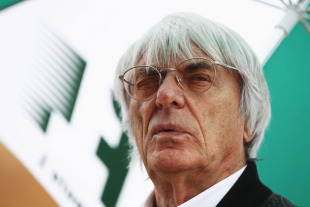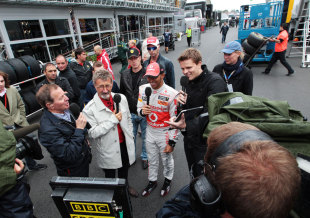- Formula Money
The challenges ahead for F1's new coalition

- Drivers:
- Bernie Ecclestone
With the stroke of a pen Bernie Ecclestone made history earlier this week when he signed his name on the contract between Formula One World Championship, the company he runs, and the coalition of the BBC and BSkyB. Next year, for the first time in F1's history, not all races will be broadcast in Britain on free-to-air television as Sky Sports will be showing all races, qualifying and practice sessions live. The BBC will be broadcasting highlights of each race but its portfolio of live broadcasts will cover just half of them. To say that it caused a stir in the fan community is a huge understatement.
An annual subscription to Sky Sports costs around £470 but for the same sum you could buy three-day general admission tickets to six races including Monaco, Silverstone, Turkey and Canada. It's little wonder therefore that a poll on one sports reporter's website showed that as of Saturday morning 81% of readers would not buy a subscription to watch F1 on Sky Sports. So how did this happen?
"The issue ultimately is the money that CVC Capital Partners, the owners, via Bernie, take out of the sport," is the explanation from another sports reporter and although it reflects the general opinion in F1 it isn't accurate. The real reason for the new deal is much more straightforward than that - the BBC broke its contract.
The BBC got the rights to broadcast F1 in 2008 with its coverage beginning the following year. The reason that the rights were available in the first place was because ITV had broken its contract which was due to run until the end of last year. According to the Telegraph and other media sources at the time, ITV dropped F1 in order to "save money which can be used to expand coverage of football." Not coincidentally, at the same time as the BBC announced it had picked up F1, ITV announced that it had retained the rights to broadcast Champions League football matches as part of a deal from 2009 to 2012.
With ITV, the BBC's main competition, out of the picture, there was no chance of a bidding war inflating the price of the F1 rights when the deal was done in 2008. More importantly, the BBC knew F1 was a distressed seller since ITV had broken its contract leaving it high and dry.
According to a report by the UK's communications regulator Ofcom, ITV was paying £29m annually under its contract which ran from 2006 to 2010. Given that F1 was a distressed seller and there was no bidding war when it was sold, it is safe to assume that the BBC paid perhaps only a 5% to 10% premium on ITV's fee which would take it to around the £31m ($50m) figure estimated in F1 trade guide Formula Money. Even this has become too much for the Beeb to justify.
Faced with a freeze on the license fee, the BBC has been forced to make cuts and it was suggested that nothing was too sacred to be dropped even its coverage of the prestigious Wimbledon tennis tournament. Despite its high viewing figures, it wasn't tough for the BBC to conclude that F1 had to be cut in some way in order to save its crown jewel of Wimbledon.
This created a dilemma for Ecclestone who said last month that "I will do my best to keep F1 on the BBC." He added that "the BBC have done a great job for us and we like their shows and the people obviously like it because so many are watching." It left the BBC with a decision: either break its contract by dropping F1 completely, a move which would have saddled it with a huge financial penalty, or find some way of reducing its annual fee. The most logical way of reducing its fee is to reduce the amount of coverage it gets and this is exactly what it did.
It wasn't that simple though. Reducing its coverage by half required finding a partner to broadcast the other 50% of races. There is good reason why the BBC turned to BSkyB.

Nevertheless, it certainly hasn't left Ecclestone out of pocket with F1 getting around £15m from the BBC under the new deal, which runs until 2018, with BSkyB paying an estimated £25m. Its premium is thought to be due to the fact that switching to pay-per-view could reduce F1's viewing figures and in turn dent the teams' sponsorship revenues which depend on wide exposure.
Earlier this month Ecclestone said "it isn't possible that F1 could go on to pay-TV, we wouldn't want to do that." Since the BBC will be broadcasting not only six races live, but also a highlights package for every race, Ecclestone has been able to stay true to his word. Nevertheless, the teams are likely to have initially seen this as a technicality. However, if BSkyB and BBC are together paying significantly more than was previously being received this will have improved the teams' moods since they share 50% of F1's profits as prize money.
Bearing this in mind, it may well be no coincidence that the teams reportedly had a hostile reaction to the deal on Friday morning, with talk that they may even try to torpedo it, but by the afternoon, once they had sat in on a joint meeting with Ecclestone in the Hungarian GP paddock, they started to show support. There were other significant factors at work too.
It is understood that the teams were not given more than 24 hours notice about the deal with many finding out from the media reports on Friday morning. The initial media reports and the press release about the deal did not state that the BBC will be broadcasting anything other than highlights for the half of the races which it won't be showing live. This hugely concerned many teams since the UK terrestrial coverage of those races would simply disappear.
It affects British teams more than the others since the heart of their fan-base is in Britain. It is why McLaren team principal Martin Whitmarsh spoke to Ecclestone about it and seemingly got him to agree to the BBC's highlights package being a delayed showing of the race itself. "Bernie assured me, and I asked him several times, the deferred coverage will not be highlights, it will be a full race," said Whitmarsh. Given that the BBC's own press release does not reflect this, and the contract has been signed, it remains to be see how much influence Ecclestone could have.
Other team principals don't seem to share Whitmarsh's concern. Lotus Renault team principal Eric Boullier said "I think it is rather good news and should be positively welcomed by fans." It is hard to understand how anyone could seriously think that fans would welcome something which previously cost £145.50 (the price of a television license fee) rising in price by an additional £470. Some may use it as a good example of how out of touch F1 is with the real world.
Ironically, the Formula One Teams Association (FOTA) has held numerous events this year to canvass fans' opinions but if it wants to avoid accusations that these were simply window dressing it could be argued that it should take a strong stand against the BSkyB deal since it is clearly not in the interests of the UK fans who do not have a Sky subscription. Likewise, FOTA claims to place environmental issues close to its heart so presumably, if the BBC and Sky Sports use two broadcast crews, as is expected, the teams' should object due to the extra emissions which this unnecessary duplication will cause.
Sadly, the very fact that the teams did not even know about the deal in advance shows just how little power FOTA really commands.

In defence, this deal only covers one territory and one sports reporter suggested it may even bring benefits for fans. "Soccer became a game of the masses. F1 in bars and pubs? Huge potential to make F1 a social event," he wrote on his Twitter page. In reality it isn't likely that this will stimulate communal viewing of F1 since there is no tradition of watching F1 in pubs as there is with football. There is also the problem that the timing of F1 sometimes clashes with football matches and these already have the run of the pubs and bars.
One conclusion which can safely be drawn from the recent decision is that it makes it even less likely that BSkyB's 39% owner News Corp will be taking over F1 any time soon as it was considering doing.
The phone hacking scandal engulfing the company already looked to have halted its interest in acquiring F1 and its broadcast deal is a further roadblock. The reason for this is that it would put News Corp on both sides of the table since it would be receiving money from broadcasters as an owner of F1 and paying money to F1 as a broadcaster itself. It is this same kind of conflict which prevented BSkyB from acquiring football team Manchester United in the late 1990s. Given that many fans strongly opposed the very idea of News Corp buying into F1 they can take consolation from the fact that the new broadcast deal has probably put the brakes on that.

